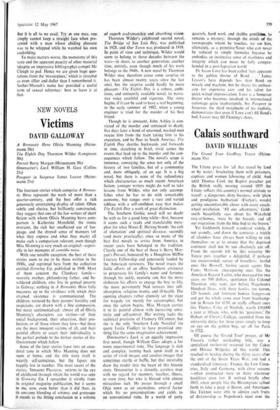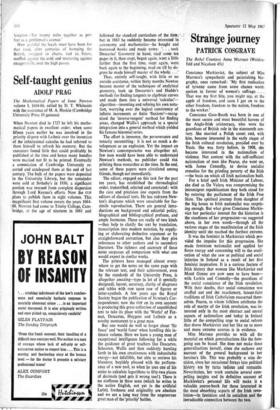Calais southward
DAVID WILLIAMS
The Litany prays for 'all that travel by land or by water.' bracketing them with prisoners, captives and women labouring of child. And
until Thomas Cook the Baptist preacher got the British really moving around 1855 the Litany reflects this country's normal attitude to travel : a dangerous, dirty business, with 'plain and prodigious barbarism' (Evelyn's words) getting uncomfortably closer with every coach- wheel revolution. 'All our adventures,' Gold- smith beautifully says about his Wakefield stay-at-homes, 'were by the fireside, and all our migrations from the blue bed to the brown.'
Yet Goldsmith himself wandered widely, if not grandly, and down the centuries a trickle of islanders have always been willing to risk themselves so as to ensure that the deprived continent shall not be too absolutely cut off. From the records left by this minority Mr Trease puts together a delightful, if perhaps too overcrowded, survey of travellers: lustful ones like Boswell, furtive secret agents like Fynes Morison, cheeseparing ones like the American Bayard Taylor, who managed for two years on 500 dollars, sportsmen like Colonel Thornton, who went, just before Napoleon's Hundred Days, with three hawks, ten horses, 120 hounds and fourteen human hangers-on and got the whole army over from Southamp- ton to Rouen for £130, or really affluent ones like Thomas Coke of Norfolk, worth £10,000 a year at fifteen, who, with his 'governor,' Dr Hobart of Christ's College, seconded from his university duties for three years simply to keep an eye on the golden boy, set off for Paris in 1712.
Of course the 'Grand Tour' proper, of Mr Trease's rather misleading title, was a specialised exc./us/the reserved for the Cokes and Horace Walpoles of this world. This reached its heyday during the thirty years after the end of the Seven Years War, and had a standardised itinerary: France, the Low Coun- tries, Italy and Germany, with close seasons —often protracted—here or there whenever hostilities grew hot. It revived briefly after 1815, when people like the Blessingtons sallied forth to take a peep at Byron. and Americans like Ticknor were able to admire such fruits of dictatorship as Napoleon's road over the Simplon—`for twenty miles together as per- fect as a gentleman's avenue.'
How grateful the locals must have been for that road, after centuries of humping the British, strapped to chairs, tied to, litters, muffled against the cold and muttering against exaggeration, over the high passes.































 Previous page
Previous page